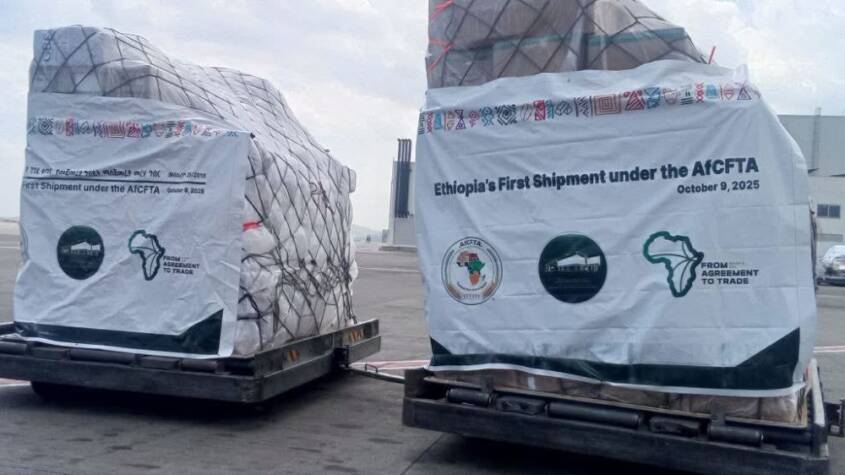Ethiopia has officially launched its first duty-free exports under the African Continental Free Trade Area (AfCFTA), sending shipments to Kenya as part of its inaugural trade operations within the continental framework. The announcement was today on Thursday, October 9, 2025, by the Ministry of Trade and Regional Integration in Addis Ababa, marking a key milestone in Ethiopia’s push to integrate its economy with regional markets and advance Africa’s single market agenda.
State Minister Yasmin Wohabrebbi confirmed that the first consignments include agricultural and manufactured goods such as meat, coffee, fruits, vegetables, beans, edible oil, and textiles, which will move via air and land routes to Kenya. Additional exports to South Africa and Somalia are expected to follow in the coming weeks. “More than 40 exporters have already registered under AfCFTA, though only a select number are participating in the initial phase as the rest finalise arrangements with their buyers,” Wohabrebbi said.
The trade launch, attended by AfCFTA Secretariat officials, government ministers, diplomats, producers, and exporters, represents Ethiopia’s formal entry into the world’s largest free trade area by membership. The AfCFTA brings together 54 African nations, creating a single market of 1.4 billion people with a combined GDP of USD 3.4 trillion, and aims to boost intra-African trade, which currently stands at less than 17 percent.
Ethiopia’s preparations for AfCFTA implementation have been extensive. The country has ratified eight key protocols under the agreement, covering investment, competition policy, intellectual property rights, dispute resolution, digital trade, and the inclusion of women and youth. It has also issued Regulation No. 574/2025, publishing its Provisional Schedule of Tariff Concessions in the Federal Negarit Gazette, and validated its national implementation strategy.
Under Ethiopia’s trade liberalisation framework, 90 percent of goods are placed in the liberalised category, subject to gradual tariff reduction to zero, while 7 percent are classified as sensitive goods and 3 percent remain in protected sectors. This approach, officials say, balances market openness with the protection of key domestic industries.
Ethiopia has prioritised Kenya, South Africa, and Somalia as its initial AfCFTA trading partners, aligning with existing transport and logistical linkages. Additional countries; including Tanzania, Uganda, Zambia, South Sudan, Nigeria, Malawi, Cameroon, and Egypt, are expected to join in reciprocal trade arrangements as the framework expands.

Image source: Africa Newspage
For Ethiopia, the launch of duty-free exports represents both an economic and strategic pivot. The country’s traditional export destinations; Asia, Europe, and the Middle East, have grown increasingly volatile, and the suspension of U.S. AGOA benefits has limited access to American markets. The AfCFTA offers an alternative route to diversify trade, strengthen value-added exports, and reduce overdependence on non-African markets.
Africa’s intra-trade proportion hovers under 17 percent, compared to North America and Europe where it can exceed 60–70 percent. The AfCFTA was designed to shift that paradigm: to remove tariff and non-tariff barriers, create a single continental market of 1.4 billion people, and channel a combined GDP of roughly USD 3.4 trillion. For Ethiopia, this progression is very strategic.
Operationally, the government faces the task of ensuring that customs systems, cargo handling, and transport infrastructure are synchronised with AfCFTA protocols. Trade efficiency, rather than tariff relief alone, will determine long-term success. To that end, the Ministry of Trade has prioritised digitisation of customs, border modernisation, and the development of transport corridors to prevent logistical bottlenecks.
The involvement of the private sector remains central. Exporters, producers, and logistics firms have been encouraged to register under AfCFTA rules to access regional markets. According to ministry data, more than 40 Ethiopian businesses have done so, though only a portion were cleared for participation in this first wave. Transparent allocation of trade opportunities will be key to maintaining public and investor confidence in the system.
The first shipments, moved by Ethiopian Airlines Cargo, carried perishable produce and meat to regional markets, showcasing the country’s air freight capacity and logistical readiness. This moment underscores the broader goal of shifting Ethiopia’s export structure from raw commodities to higher-value agricultural and manufactured goods, stimulating domestic processing, packaging, and quality control industries.
Observers note that if Ethiopia maintains consistent export volumes under AfCFTA, it could gradually build regional value chains and improve foreign exchange stability. The initiative also presents opportunities for small-scale producers and cooperatives to reach new markets under harmonised trade rules.
Regional peers are watching closely. In East Africa, Kenya, Uganda, and Tanzania are already strengthening their logistics and customs systems to align with AfCFTA operations. Ethiopia’s entry adds momentum to this effort, reinforcing East Africa’s collective ambition to establish itself as a key corridor in Africa’s new trade geography.
While Thursday’s launch was modest in scale, its significance lies in continuity. Sustained trade over the coming months will determine whether the AfCFTA transition delivers tangible benefits for Ethiopian businesses and farmers. For now, Ethiopia’s entry into the agreement marks an important step toward regional integration and continental economic transformation.
Read also: Ethiopia clears final hurdles to begin trading under Africa Free Continental Free Trade Area
Follow us on LinkedIn: Africa Sustainability Matters
Engage with us on LinkedIn: Africa Sustainability Matters




